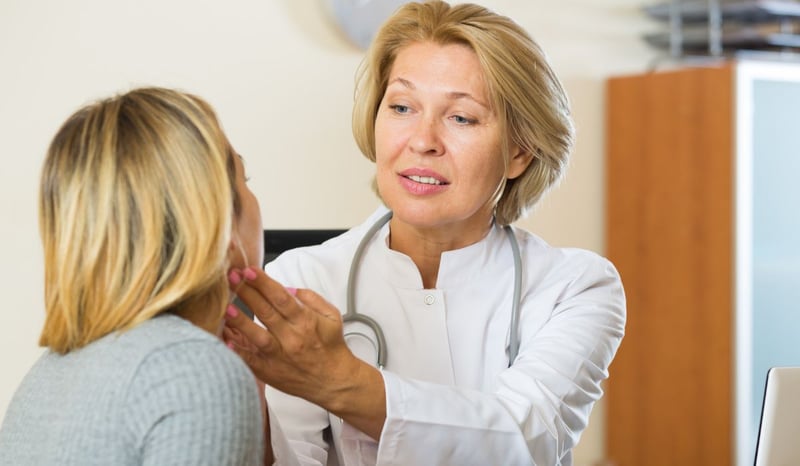
Lymph nodes (also called lymph glands) are an important part of your immune system. These small structures filter lymph fluid that drains from your cells and tissues. Some lymph nodes are as big as an inch across, while others are as small as a pinhead. They’re located throughout your body, with clusters located at the sides of your jaws, in the neck, upper chest, under your arms, and in your groin on either side of the pubic bone.
If you’ve ever been sick and noticed "swollen glands" in your neck, those are your lymph nodes working hard to defend your immune system from the bacteria and viruses that your lymph system has detected. They can also become enlarged or sensitive to the touch when your body is detecting a condition such as cancer, including lymphoma, leukemia, breast cancer, colon cancer, and others.
The Connection Between Lymph Nodes and Cancer
Cancer can appear in lymph nodes in two ways:
- It can spread to the lymph nodes from somewhere else
- It can start in the lymph nodes
Lymph Node Involvement When Cancer Starts Outside of the Lymph System
Because lymph fluid carries cells around the body, it can sometimes carry cancer cells from their starting point to other areas of the body. For example, if the diagnosis is breast cancer, then the breast cancer cells may have traveled to the lymph system.
If the oncologist determines that cancer has spread to the lymph nodes from another starting point, this is considered regional spread. Lymph node involvement is a part of determining the stage of cancer and the treatments that will be needed. Learn more about the role of lymph nodes in breast cancer.
Cancer that Starts in the Lymph System
Cancer that starts in the cells of the lymph system is called lymphoma. Lymphoma is considered a type of blood cancer that can begin almost anywhere since lymph tissue is found throughout the body. There are two main types of lymphoma: Hodgkin's and non-Hodgkin's lymphoma. Both of these types of cancer can be successfully treated, especially when caught early. But even Stage III-IV non-Hodgkin’s lymphomas can be treated very effectively with today’s advances in lymphoma treatments.
Signs to Watch for in Your Lymph Nodes
Swollen lymph nodes can be attributed to many things, including a cold or strep throat. If you aren’t experiencing an obvious illness, you should schedule an appointment with your physician if you notice your lymph nodes are swollen, hard to the touch, or sensitive. When any of the following symptoms accompany swollen lymph nodes, be sure you tell your doctor during your appointment:
- Fatigue
- Night sweats
- Fever that isn’t related to a virus or known bacterial infection
- Unexpected weight loss
- Coughing, chest pain, or shortness of breath
- Easy bruising or bleeding
- Abdominal pain or swelling
- Frequent or severe infections
- Feeling full after eating just a small amount of food
Be sure you don’t delay in having your lymph nodes evaluated by a medical professional if you notice something abnormal. It’s a good idea to start with your primary care physician or gynecologist for further evaluation.
The healthcare professional is likely to ask you questions about whether you’ve recently had an upper respiratory infection, strep throat, any skin infections, or other conditions that could cause lymph nodes to stay swollen for a little while. The swelling is caused by more blood cells coming to fight off an infection or foreign bodies. Even if you don’t have a current infection, let them know about anything in the past few months. It can sometimes take a while for the lymph nodes to return to their normal size.
Your primary care doctor will oversee the tests that are needed to determine if cancer is present. If it is, you’ll need to be treated by a cancer specialist, called an oncologist.
How Does the Oncologist Evaluate Lymph Nodes for Cancer?
If cancer is suspected or you have already been diagnosed, your oncologist will first feel the lymph nodes closest to the surface of the skin to check for soreness or swelling. For this reason, there may be an MRI, ultrasound, or CAT scan used to spot any enlargement. If the scans show signs of swelling, a biopsy is most likely the next step.
A lymph node biopsy is the final say on whether cancer cells are present in the lymph system. This may be done during surgery to remove the cancer, although sometimes it's done in a separate procedure. A small amount of dye is placed at the site of the tumor to see which lymph node is closest. That lymphoma node, called the sentinel lymph node, may be removed for testing. The removed tissue is looked at under the microscope by a pathologist to find out if there are cancer cells in it. Once analyzed, the pathologist prepares a report noting whether there are any signs of cancer. If a node has cancer, the report describes it in detail.
The Latest in Cancer Care in the Portland-Vancouver Area
The cancer treatment centers of Compass Oncology offer advanced, personalized treatment options and expert guidance from board-certified oncologists. If you have received a cancer diagnosis, request an appointment with one of our oncologists. We’re also available to provide second opinions on a cancer diagnosis and treatment recommendation.



.jpg?width=370&name=difference%20between%20bone%20cancer%20and%20multiple%20myeloma%20-%20compass%20oncology%20(1).jpg)